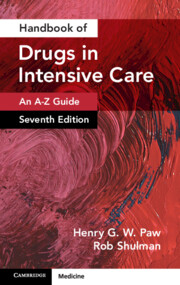Book contents
- Handbook of Drugs in Intensive Care
- Handbook of Drugs in Intensive Care
- Copyright page
- Dedication
- Contents
- Introduction
- How to Use This Book
- Common Abbreviations
- Acknowledgements
- Drugs: An A–Z Guide
- Chapter A
- Chapter B
- Chapter C
- Chapter D
- Chapter E
- Chapter F
- Chapter G
- Chapter H
- Chapter I
- Chapter K
- Chapter L
- Chapter M
- Chapter N
- Chapter O
- Chapter P
- Chapter Q
- Chapter R
- Chapter S
- Chapter T
- Chapter V
- Chapter Z
- Short Notes
- Appendices
- Drug Index
Chapter Z
from Drugs: An A–Z Guide
- Handbook of Drugs in Intensive Care
- Handbook of Drugs in Intensive Care
- Copyright page
- Dedication
- Contents
- Introduction
- How to Use This Book
- Common Abbreviations
- Acknowledgements
- Drugs: An A–Z Guide
- Chapter A
- Chapter B
- Chapter C
- Chapter D
- Chapter E
- Chapter F
- Chapter G
- Chapter H
- Chapter I
- Chapter K
- Chapter L
- Chapter M
- Chapter N
- Chapter O
- Chapter P
- Chapter Q
- Chapter R
- Chapter S
- Chapter T
- Chapter V
- Chapter Z
- Short Notes
- Appendices
- Drug Index
Summary
Zinc is an essential constituent of many enzymes. Deficiencies in zinc may result in poor wound healing. Zinc deficiency can occur in patients on inadequate diets, in malabsorption, with increased catabolism due to trauma, burns and protein-losing conditions, and during TPN.
- Type
- Chapter
- Information
- Handbook of Drugs in Intensive CareAn A-Z Guide, pp. 322Publisher: Cambridge University PressPrint publication year: 2025

